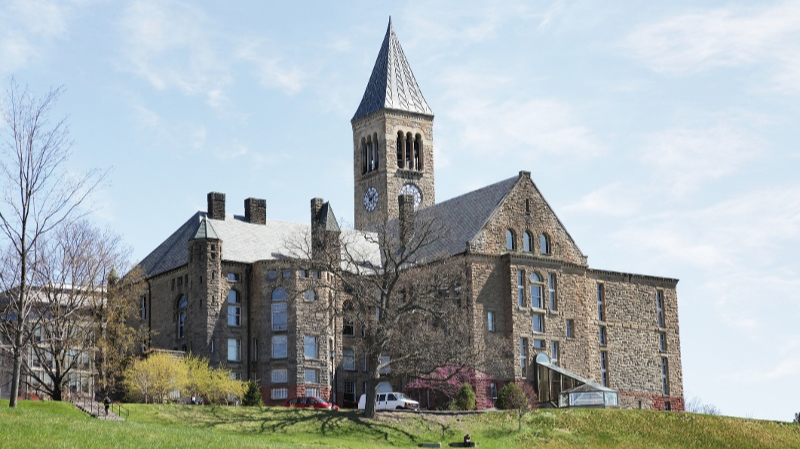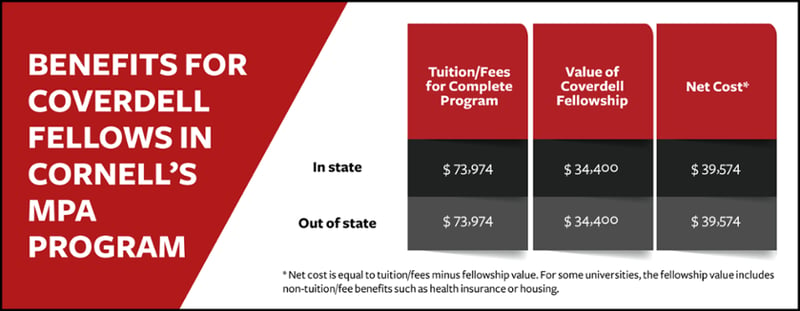Understanding The Coverdell Fellowship for Returned Peace Corps Volunteers

Are you a Returned Peace Corps Volunteer?
Looking for a graduate degree that will help you make the world a better place?
If you're a Returned Peace Corps Volunteer (RPCV) who wants to develop a career that builds upon the work you did in the Peace Corps, consider a Master’s degree in Public Administration (MPA). Cornell University’s MPA is the perfect degree program for launching careers focused on improving people’s lives. Cornell also supports the Coverdell Fellowship, which provides significant tuition relief for RPCVs.
Cornell University Supports the Coverdell Fellowship:
The Paul D. Coverdell Fellowship is a graduate fellowship program that offers significant financial assistance to RPCVs. As part of their academic study, all fellows complete internships in underserved communities in the U.S. The chart below provides a breakdown of the benefits of the Coverdell Fellowship:

Cornell & The Peace Corps Community:
- Ithaca currently ranks as No. 3 among metropolitan areas for the highest number of Peace Corps volunteers per capita, with 9.8 volunteers per 100,000 residents.
- Cornell has also just been announced as the No. 21 Top Volunteer-Producing Colleges and Universities list among schools with between 5,000 and 15,000 undergraduate students.
- In 2018, 16 Cornell students were involved with the Peace Corps and, according to the organization, 1,678 Cornell alumni have participated since the Peace Corps’ inception – 400 more than the next closest Ivy League school, Harvard University (2018 stat).
- Throughout the last decade, as Ithaca has stayed high in the overall community Peace Corps participation rankings, Cornell has been in the top 25 among colleges its size as well.
Hear from an RPCV who is getting an MPA Cornell University:
Sarah Cartagena is a second-year CIPA student who is concentrating her studies on Human Rights and Social Justice. She's also a Returned Peace Corps Volunteer. Here are a few of her thoughts on getting an MPA at Cornell University.
"When I returned from my Peace Corps service in Madagascar, I knew that I wanted to further the knowledge and skills that I had gained from my experience by pursuing a Masters of Public Administration degree in Human Rights and Social Justice. Throughout my graduate school search, my three key necessities were that the program be affordable, interdisciplinary, and experiential. After rigorous research, I found these requirements in only one program: CIPA.
Now, a year later, I am enthusiastically concentrating my studies on Human Rights and Social Justice, with a focus on migrant rights. I am preparing to start my second year filled with courses from CIPA, as well as from the Law School and the College of Agriculture and Life Sciences to complement my focus.
The balance between flexibility and structure that CIPA offers has allowed me to gain concrete skills necessary for a successful career in my field. At the same time, the flexibility has given me the opportunity to explore my interests and curiosity in other subjects. My internship this past summer is a perfect example. I served as a program assistant with Humanity Crew, an NGO that provides psycho-social support to Syrian refugees. I was able to attain this position because of the policy and research background that CIPA prepared me with and the connections created through a CIPA consulting course."
Pro Tip: Check out our resource — The Cornell MPA for Returned Peace Corps Volunteers — to learn everything you need to know about jumpstarting your MPA and taking advantage of the Coverdell Fellowship at Cornell University.
Ready to learn more about getting an MPA at Cornell University?
Cornell’s MPA places a strong emphasis on experiential learning. Real-world consulting opportunities, internships, off-campus study, and Capstone experiences help you develop the skill set you need to be successful in your future careers, and provide relevant material for inclusion in résumés and job interviews. Cornell’s interdisciplinary curriculum also affords you the opportunity to work with renowned faculty across many different departments, schools, and colleges at Cornell, which is among the largest and most diverse of the Ivy League universities.
"Our graduates experience tremendous success finding employment across many key areas of public policy including education, healthcare, criminal justice, sustainability, infrastructure, and economic policy. If you are looking for an opportunity to make valuable contributions to the world around you, then you should make CIPA the next step in your career.”
—Maria Fitzpatrick, CIPA Director
If you're committed to continuing to impact positive change in the world as an RPCV, we encourage you to reach out to us today to learn more about getting an MPA at Cornell University!


